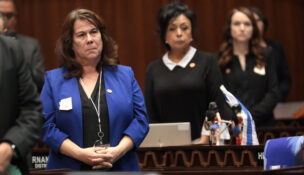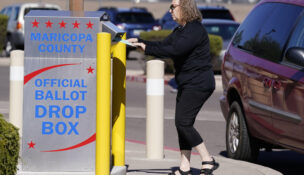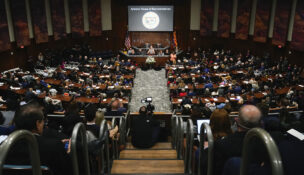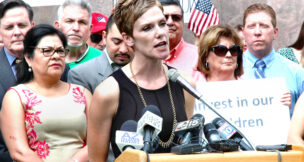Emails upend lawsuit over Prescott rodeo
Howard Fischer, Capitol Media Services//August 26, 2024//
Some newly discovered emails could undermine the bid by state lawmakers to allocate $15.3 million for the Prescott Rodeo.
Documents filed in court by those challenging the funding appear to show that the state Treasurer’s Office actually agreed to provide another $10 million to the International Dark Sky Discovery Center in Fountain Hills even before it had requested proposals from others who might have qualified for the cash. Only later, after the money already was promised, did state officials follow what the law requires.
What makes that relevant is that the two allocations were part of the same 2023 legislation which entitled state lawmakers to earmark some of the state’s surplus to pet projects.
And while the pending lawsuit challenges only the funding for the rodeo, attorneys for those who sued show that the documents related to the dark sky project show that the Treasurer’s Office was trying to “manufacture legal cover” once the lawsuit was filed to show they were following the law.
Attorneys for both sides cannot comment directly on the documents as the judge, at a Monday hearing, ordered them sealed.
But Capitol Media Services and the Yellow Sheet Report, a sister publication of the Arizona Capitol Times, already had obtained copies. And attorneys for the plaintiffs, in new legal filings, show that they undermine the claims made by the state that there was nothing improper in the process, currently on hold, to get money to the Prescott Frontier Days, the private organization that operates the rodeo.
If the judge agrees, the funding for the rodeo could go away; it is too late to challenge the dark sky project as those dollars have already been distributed.
The case, however, has even broader statewide implications. A ruling in favor of challengers would put a big dent in the future ability of lawmakers to hand over state funds to private groups without getting something in return, something that would be a clear violation of the Gift Clause of the Arizona Constitution.
The issue traces its roots to the budget adopted by lawmakers in 2023 for the current fiscal year.
Flush with cash, legislative leaders gave each lawmaker a certain amount of cash — often between $20 million to $30 million, to allocate for projects.
Some of that $2 billion went to road improvements in their districts. Several pooled their cash for a one-time family tax rebate.
But there were other priorities, including $15.3 million for “a nonprofit volunteer organization that operates a rodeo at the Yavapai County fairgrounds.” But the understanding, not stated in the legislation, was the dollars were supposed to go to a $40.7 million master plan to renovate the rodeo grounds, which Prescott Frontier Days leases from the city.
Those dollars came from allocations given to state Reps. Quang Nguyen of Prescott Valley and Selina Bliss of Prescott.
That provoked a lawsuit filed in June 2023 by the Arizona Center for the Law in the Public Interest on behalf of Prescott residents Howard Mechanic and Ralph Hess, the latter a retired Yavapai County Superior Court judge. They charged it violates the Gift Clause because it “is not supported by any consideration, let alone a promise of significant direct benefits that serves a public purpose as required by … the Arizona Constitution.”
Courts generally have said the fact that a project would increase sales tax revenues is insufficient to meet the requirements of the Gift Clause.
And then there is the separate question, raised in the lawsuit, about whether the recipient actually would have to spend the money to further the rodeo.
In filing suit, challengers said the state and Prescott Frontier Days never signed a contract spelling out exactly how the money would be used. Instead, that was supposed to be worked out later.
They also said there were no details about what the state would get in return.
Responding to the lawsuit, officials from the state argued, among other things, that they would follow the same procedure of seeking a formal “request for information” for this project before actually awarding any cash, as required by law, as they planned to do for the dark sky project.
The only thing is, the records show the State Treasurer’s Office already had assured the International Dark Sky Discovery Center their funds were approved, even to the point of sending it information about how to have the money deposited into its bank account.
“The newly discovered evidence shows that Arizona State Treasurer’s Office came up with the RFI process to manufacture ‘legal cover’ once the suit was filed,” the challengers charge.
They even cite an email by Jeff Kros, an employee of the office, saying, “I just want to have as much legal cover as possible.”
Also now part of the record is an email from Hayleigh Crawford, an attorney for the state, to Brian Bergin, an attorney for Prescott Frontier Days. It states that the Treasurer’s Office had told her they believe “the treasurer’s role is just to disperse (sic) the money and as such, the treasurer does not have the authority to enforce the use of funds.”
That, said attorneys for the challengers, is “inconsistent” with a declaration that Kros made which claims that the scope of grant agreements handled by his office “would limit the use of funds to specific public purposes.”
All that, the challengers say, not only contradicts what Kros had said about how the funds are awarded but “undermines the factual bases of the state’s and Prescott Frontier Days’ defense.”
“They demonstrate that the entire RFI process conducted by Arizona State Treasurer’s Office regarding the other appropriations was created in response to this lawsuit to manufacture legal cover,” they told the judge.
There is a potential weak spot in the ability of challengers to use the documents to sideline the appropriation.
Some of the emails are communications between the Treasurer’s Office and attorneys for the state. And, generally speaking, they are protected by attorney-client privilege and cannot be used in court.
In this case, however, the Treasurer’s Office had released them to an unidentified third party who had made a public records request. And if that release was voluntary, a judge could conclude the state waived any claim of privilege.














































